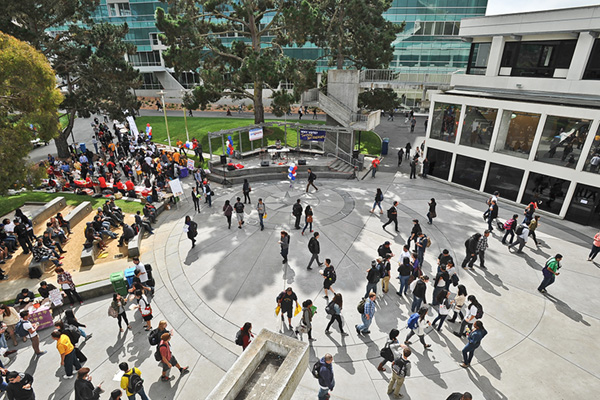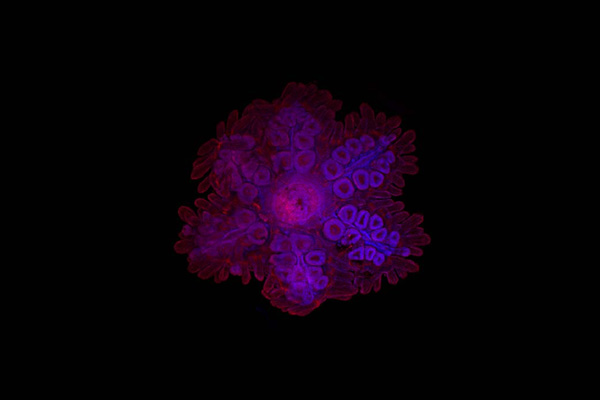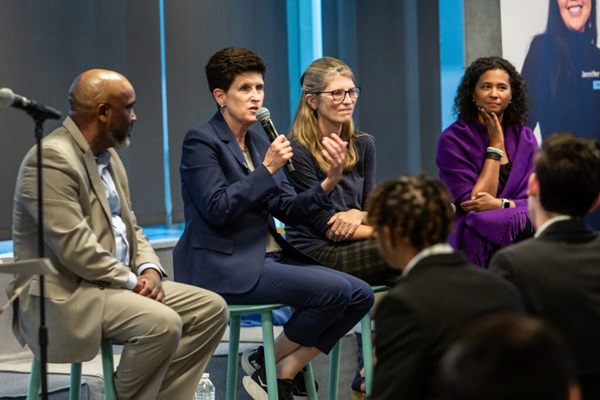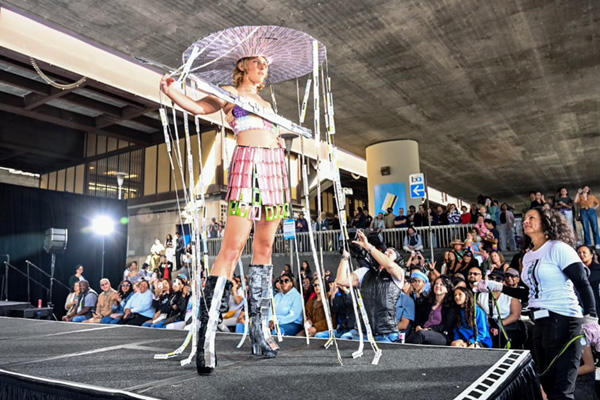News and Announcements

SF State and San Francisco Federal Credit Union (SFFedCU), a not-for-profit financial cooperative that serves San Francisco and San Mateo counties, have teamed up as part of a strategic collaboration to enhance the programs and services offered to students and campus employees.
Through this partnership, SFFedCU will have access to a menu of sponsorship opportunities across various SFSU activities, including programming and events organized by Gator Athletics, the University’s athletics arm. Funding from the sponsorship will bolster athletic operations, scholarships, financial education programs for students and employees, as well as University fundraising priorities like enhanced career preparedness programming.
“It made perfect sense for us to work with the San Francisco Federal Credit Union as its core values closely align with ours,” SFSU Vice President of University Advancement and SF State Foundation President Jeff Jackanicz said. “The credit union has a strong commitment to diversity and upward economic mobility, and deeply cares about the communities which they serve — values the University also stands by.”
Funding from SFFedCU sponsorships will support student-athletes and their success through scholarship opportunities and provide resources for Gator Athletics’ general operations and programming.
“This collaboration is based on a shared dedication to bettering our communities through accessible financial literacy and economic preparedness programs,” said SFFedCU Interim CEO Ray Shams. “By partnering with SFSU, we can fund activities that will resonate with students and university employees and have widespread impact.”
“Our student-athletes invest in themselves and in the University through both their sports and academics. We are thankful that the San Francisco Federal Credit Union has taken notice and wants to invest in furthering that success,” SFSU Interim Director of Athletics Brandon Davis said. “The credit union’s support will allow our student-athletes’ performance in the classroom and in their respective sports to reach new heights.”
Specific ways the partnership will benefit the campus community also include:
- SFFedCU will offer online and in-person financial education programming to complement what the university already offers.
- SFFedCU’s Foundation will provide annual support to scholarships, including the Presidential Scholars Program.
- Funding from the sponsorship will also support the University’s overall fundraising priorities, such as enhanced career preparation programming for students.
Photo by Gino de Grandis

Back in grade school, many of us read biology textbooks filled with illustrations of cells, organelles and chromosomes. But in the real world, scientists have methods to light up cells (sometimes colorfully) to view these elements with their own eyes. At SF State, these researchers are students using the on-campus Cell and Molecular Imaging Center (CMIC).
“When you are the person who gets to prepare the samples and put it in the microscope and are able to take those pretty images … wow, it’s amazing. I didn’t know I could do that,” said Judy Abuel (B.S., ’22; M.S., ’24).
The CMIC recently achieved a major milestone: It surpassed 1,000 student trainees since 2003. Many of those were master’s students, and even more were undergraduates getting a taste of hands-on high-tech science in Hensill Hall. Approximately 36% of all CMIC students are from underrepresented communities.
The CMIC provides SF State researchers access to cutting-edge equipment, data analysis tools and extensive training. It’s that last point — the extensive training — that is key to the students’ success.
Marketable skills
“Ultimately, we’re trying to get students jobs, so a lot of the CMIC’s mission is to try to make sure that they’re trained on up-to-date scientific equipment and that they get research experience, which will make them more competitive at getting jobs,” CMIC Director Annette Chan said. Faculty like Biology Professor Diana Chu periodically write grants to ensure the CMIC has the best equipment, including awards from the National Science Foundation Major Research Instrumentation program.
“I think when [students] leave, they can feel more confident that they understand what they are doing. They know how to use the technology that’s relevant to where they are going. It’s very impressive,” Chu said. The resulting high-quality data helps students publish in scientific journals and present at local, national and international conferences, making them competitive for graduate school and industry.
“I did an oral talk last year at a conference. That was my first time showing my pretty [CMIC] images to people, and I could tell that a lot of people were so surprised because I was just a first-year master’s student,” said Abuel, who just started working on her Ph.D. at UC Davis, largely because of her CMIC experience. Like most students, Abuel came to the CMIC with no prior advanced microscopy training.
“I am pretty confident that if I go to a different institution and use their microscope, I would not need a lot of help trying to figure out how to use it,” she added, crediting the variety of CMIC equipment and training.
Training experts
Molecular Biology senior Angelo Orozco first used the CMIC as a sophomore to learn flow cytometry (a way to quantify cells based on physical/chemical properties), a skill widely used in biomedical research and industry. He says it was stressful but the experience gave him a deep understanding of the technique so he could mentor his colleagues.
“I was the [lab’s] resident flow cytometer expert so I had to teach all of these master’s students who might need it for their projects,” Orozco said.
These days, he’s shifted to the CMIC’s microscopes. He’s surprised by the variety and caliber of experiences he’s had this early in his career.
“It just opens so many doors. Even if you don’t use it in the future, it’s still something to show that you are getting out there and you’re learning new things. It also helps you gain new perspectives on anything you might do in the future,” he explained.
Orozco and Abuel admit that working in the CMIC can be intimidating. Coming in with minimal or no prior experience, they were trained to independently use equipment that costs hundreds of thousands of dollars. Damaging a device can be costly, ruin experiments and halt work in multiple labs for weeks or longer. However, Chan credits students for the fact that the CMIC equipment rarely encounters issues.
‘The best mentor’
The students and Chu stress Chan’s role in the CMIC’s story. Her expertise, mentorship and patience are critical to the CMIC’s success, they say.
“She’s probably one of the best mentors I’ve ever had,” Orozco said. “I would be in the CMIC very late at night, and [if I have a] question or anything went wrong, all I had to do is email her and she would respond very quickly. She’s always there for you.”
Chan, the sole person running the day-to-day CMIC operations, trains multiple students per week. Each training can last multiple hours and span several days. This level of output is rare and impressive.
“I think [Annette] provides the most thorough training you can imagine,” Chu said. “I think that’s very different from other facilities and facility managers. I think the training [students] get at CMIC is one of the best anywhere.”
As for Chan, she beams with pride thinking of the students working at the CMIC. She’s inspired by the students and in awe of their work, dedication and conscientiousness.
“I always tell people I get the cream of the crop at San Francisco State because these students are highly motivated,” Chan noted. “At SF State, teaching is a big component, which is why I love it here.”
Learn more about the College of Science & Engineering’s centers and research facilities.
Photo by Ben Lee

SF State and the nonprofit Braven hosted a launch event Sept. 16 to celebrate their partnership and highlight their commitment to empowering students on their path from college to career. Over the next five years, SF State and Braven aim to empower about 4,400 students with the skills, experiences and networks they need to thrive in their careers. This includes access to mentorship, networking, internship and job opportunities, and career development workshops.
The event was held at Atlassian’s U.S. headquarters and brought together a diverse group of stakeholders, including University leadership, faculty and staff, Braven staff, as well as community leaders and employer partners to discuss economic opportunities and mobility for students in San Francisco and the Bay Area.
Mary Huss, SF State University Foundation chair and emerita president and publisher of Silicon Valley Business Journal and San Francisco Business Times, moderated a discussion on the challenges and opportunities facing students in today’s job market and how SF State and Braven are working with employers, nonprofits and community organizations to address these critical issues.
During the discussion, University President Lynn Mahoney emphasized the shared vision between SF State and Braven, stating, “San Francisco State University and Braven share a common vision of a college degree and career preparation as critical to educational equity and upward mobility. Together, we will empower students and propel them on their path to economic success after graduation. Our partnership builds on the widely recognized work of SF State to provide access to world-class academic programs and degree attainment for our students, many of whom are Pell Grant recipients or first-generation college students.”
Learn more about the event and the University’s partnership with Braven.
Pictured from left: Sam Cobbs, CEO of Tipping Point; Lynn Mahoney, president of SF State; Meg Garlinghouse, vice president, social impact, LinkedIn; and Aimée Eubanks Davis, founder & CEO of Braven. Photo by Joe Mazza Photography.

The U.S. Department of Energy (DOE) Office of Advanced Scientific Computing Research recently awarded a $250,000, five-year grant to Computer Science faculty members E. Wes Bethel and Daniel E. Huang. They are part of a multi-institutional quantum computing research team that is led by Talita Perciano at Lawrence Berkeley Laboratory and includes Argonne National Laboratory.
The research effort aims to bridge the gap between theoretical quantum advantages and practical scientific applications by developing quantum algorithms and quantum machine learning methods with a focus on efficient data encoding to achieve quantum utility across diverse scientific domains. Classical data processing for DOE experiments is computationally expensive, while quantum algorithms hold promise for solutions of classically intractable problems. However, many current quantum algorithms have not demonstrated significant speedups over classical methods. The team’s approach involves developing quantum algorithms for classical data applications, emphasizing efficient quantum data encoding and error mitigation. They will explore the interplay between scientific data analysis algorithms, data types, quantum data encoding, and current quantum hardware across problems from multiple scientific domains.
Bethel and Huang will leverage the new funding to create unique research experiences and opportunities for Computer Science students at SF State. In particular, students will gain experience in developing quantum machine-learning implementations that work with data from the classical world and run on quantum simulators and on actual quantum hardware.
The Office of Strategic Marketing and Communications (SMC) encourages all employees to complete an online survey sharing their unique input about how others perceive SFSU and the University’s mission. Survey results inform how SMC tells SFSU’s story to prospective students and families in communications and marketing campaigns.
Please fill out this brief survey with your honest feedback and thoughts. All responses are anonymous. The survey takes about 15 minutes to complete.
In 2003, the California State Legislature passed Assembly Concurrent Resolution 124. It commended the Educational Opportunity Program (EOP) for its achievements and designated September as EOP Month.
Throughout the years the Educational Opportunity and Pathways Program has lived up to its commitment to serve students and to help them gain access to higher education through mentoring, tutoring, advising and financial assistance.
Per Academic Senate Policy F19-177, the Educational Policies Committee must inform the campus community of the following discontinuance proposal two weeks before Senate action.
Discontinuance has been proposed for the Bachelor of Arts in Earth Sciences and will be reviewed by the committee in October.
To file a response, please email Claude Bartholomew at claude@sfsu.edu.
SF State librarians have created Canvas modules to help faculty members incorporate information literacy competencies into their courses. These modules, in the SFSU Canvas Commons, can be modified to fit any course. Go to Canvas Commons, click “Filters” and under “Shared With” select “J. Paul Leonard Library at SF State”:
Additionally, four modules are available from the Labor Archives and Research Center:
- “Oral History Toolkit”
- “What is a Union?”
- “Filipino American Community and Identity in the Pajaro Valley”
- “Watsonville Canneries Strike, 1985 – 1987”
Most of these modules have been adapted from the Teaching Research Toolkit, a collection of resources and activities to help scaffold the research process throughout your course.
This resource will continue to grow and evolve, and the Library welcomes feedback and requests. For questions, please email the Library Student Success and Engagement Team at libsse@sfsu.edu.
Calling Gator student artists: Create the official SF State “I Voted” sticker to be distributed to all students who vote at the on-campus polling station in the upcoming general election. This contest is open exclusively to SF State students.
Please visit the contest web page for more information. Submissions are open through Thursday, Oct. 10.
The SF State Academic Senate met on Tuesday, Sept. 17, via Zoom.
The Senate heard:
- in first reading the following proposals:
- Minor in Deaf Studies and American Sign Language
- Minor in Philosophy and Religion
- Minor in Religious Studies
- Certificate in Digital Marketing
- Certificate in International Risk Analysis
- Presentations from University Advancement on renaming of the Gymnasium building and from Strategic Marketing and Communications on marketing updates.
Please view the full agenda, meeting materials and minutes on the Academic Senate website.
SF State partners with other CSU campuses to provide workshops to employees. The CSU Cross-Campus Collaboration extends workshops beyond campus borders, creating an alternative way to share professional development across the CSU.
Workshops include:
- “Facilitating Challenging Conversations series: Preparing Yourself for Challenging Conversations” (part 1 of 3)
- “Excel Tips and Tricks”
- “Living to Work, Working to Live”
- “Design Studio: A Blueprint for Workplace Trainings”
- “Onboarding and Offboarding Employees – Keys to Continuity”
- “Atomic Habits: Becoming the Architect of Your Life”
- “Weekly Dose of Mindfulness”
To sign up for a workshop, please visit the Live Learning Programs web page.
The Center for Equity and Excellence in Teaching and Learning (CEETL) organizes meetups for faculty to check-in briefly about their writing and to work quietly on individual writing projects.
The meetups are scheduled for every first and third Tuesday, 1 – 3 p.m., and every second and fourth Friday, 1 – 3 p.m. Tuesday sessions will be hybrid; join virtually or come to Library 242. Snacks will be provided. Friday sessions are on Zoom. The first session is Tuesday, Sept. 3, 1 p.m. in Library 242.
Do your eyes get blurry and irritated? Are you tired sitting at the computer? Do you experience back or neck pain at the end of the day? Attend the Holistic Health Lecture Series’ “Clear Your Vision” on Tuesday, Sept. 24, noon – 1 p.m., in HSS 306.
Meir Schneider will discuss the principles of natural vision improvement and simple strategies to prevent vision degeneration and improve vision and health.
The Holistic Health Lecture Series is sponsored by the Institute for Holistic Health Studies and the Department of Recreation, Parks and Tourism.
SF State’s partnership with the Employee Assistance Program/LifeMatters brings learning opportunities this fall for all employees. Presentations include “Stress-Sleep Correlation” (Friday, Sept. 27), “Business Etiquette,” Excel tips, branding, “10 Steps to Financial Success,” “Understanding your CalPERS Retirement Benefit,” saving with a 401K, using the employee tuition/fee Waiver and more.
To RSVP and for more events, please visit the Human Resources events/training web page.
The Center for Equity and Excellence in Teaching and Learning (CEETL) will facilitate a six-week online learning community for lecturer faculty in their first and second years. The learning community will introduce evidence-based foundations of college teaching, foster connections amongst new lecturer faculty and create a space for colleagues to share student success resources.
The course runs Oct. 8 – Nov, 17. Lecturers who complete the 10-hour course will be paid a $500 stipend. The course has a flexible design to accommodate the scheduling needs of participants.
Project Rebound will host its seventh annual mural celebration event on Thursday, Oct. 10, in Jacks Adams Hall, Cesar Chavez Student Center.
Please RSVP via Google Forms. This event is expected to be at full capacity, and the first 200 student RSVPs will be accepted.
Schedule:
- Noon – 12:30 p.m.: Doors open; sounds of resilience
- 12:30 – 1 p.m.: Land acknowledgement; “Why the Mural Theme ‘From Incarceration to Liberation’”
- 1 – 1:30 p.m.: Monologues and performances: Artists and storytellers from Opportunity Scholars will join via Zoom while incarcerated in Maine to read excerpts from their poetry anthology, “What Are We Waiting For?”
- 1:30 – 2:30 p.m.: “Wisdom of the carceral experience through verbal expression”: Spoken word from students from SFSU, Portland State University and CSU East Bay
- 2:30 – 3 p.m.: Break
- 3 – 3:15 p.m.: “Thin Line between Victim and Victimizer”: Candid talk with special guest Gypsy Rose Blanchard-Anderson
- 3:15 – 4:15 p.m. - Moderated panel conversation with Blanchard-Anderson
- 4:15 – 4:45 p.m. - Q&A
This event will be filmed by both Associated Students and a third-party production company. For those who prefer not to appear in media, sections will be marked off to avoid filming.
Campus Safety Week is a campus-wide effort to raise awareness about personal safety and the resources available for promoting health and safety in personal and occupational environments. Join Environment, Health and Safety from Monday, Oct. 14, to Friday, Oct. 18, for a week full of fun and informative trainings. Campus Safety tabling day is Wednesday, Oct. 16.
Please visit the Campus Safety Week web page to register for trainings.
Calling all artists, creators, makers, innovators and tinkerers! Join the Staff Maker Faire to exhibit and sell original work on Wednesday, Nov. 13, 10 a.m. – 2 p.m., in the Science & Engineering Innovation Center.
To participate, please complete the Qualtrics form. For questions, please email the Staff Council at askstaffcouncil@sfsu.edu.
SF State Spotlight

Apparel Design and Merchandising Lecturer Faculty Kamal Ragbotra and Nancy Martin incorporated the Bay Area Rapid Transit’s (BART) “Project Doneway” fashion show into their “Apparel Design I: Draping” courses as a first-semester project.
On Sept. 14, students from Bay Area fashion schools, including SF State, City College of San Francisco, Oakland School of the Arts and the Academy of Art University, walked the runway outside the Rockridge BART Station in front of hundreds of viewers. The transit agency challenged students to create garments with its now-defunct paper BART tickets.
SFSU students entered 10 garments into the show and won first, second, and third prizes in the college category, plus the award for the best use of the BART tickets. Prizes include prepaid Clipper Cards and the opportunity to work with BART on designing merchandise sold to the public. Press for the event includes a story in the Golden Gate Xpress and interviews with KPIX-TV and KTVU-TV.
The finished garments will be displayed through Thursday, Sept. 26, in Burk Hall 334, and will then be displayed at BART headquarters in Oakland for a monthlong exhibition.
“These awards highlight the ingenuity that comes out of our small but mighty apparel design program!” Martin said.
Caption: Lux Anne Vargas models an outfit designed with fellow students Sebastian Vogelmann, Keeley Ward, Lexi Ulloa and Hikari Nakatani.
On Sept. 17, “NBC Morning News NOW” interviewed Creative Writing Professor May-lee Chai following the false, racist “immigrants-eat-pets” tropes repeated by Donald Trump and JD Vance. She discusses the 19th-century anti-Chinese-immigrant origins of the racist trope that has been weaponized against Haitian immigrants and the Haitian American community in Springfield, Ohio.
“It was a lie then and it’s a lie now,” Chai said.
Chai’s family has historical connections to Springfield: In 1930 her grandparents became the first Chinese couple to be married in the city, and her grandmother and father both attended Wittenberg University there.
“It has been a very welcoming place for my family, so it’s deeply disturbing to read about all the attacks on the Haitian immigrant community and Haitian Americans and to hear this hateful rhetoric about immigrants in Springfield,” she said.